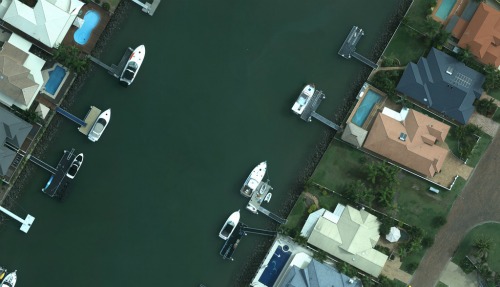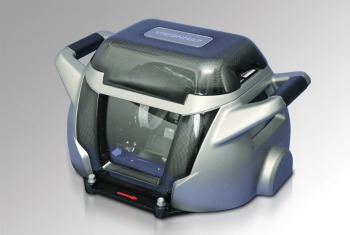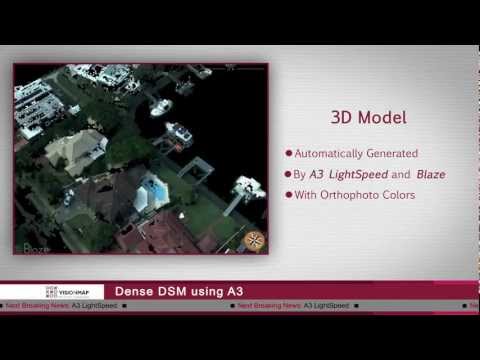Israel’s VisionMap makes advanced 3D aerial photo systems for applications from disaster relief to security to urban planning.

If you’ve successfully located a specific pizza parlor; the source of a forest fire; or an accident victim needing rescue, VisionMap may be the company to thank.
The Israeli company founded by a computer-science whiz kid makes some of the world’s most advanced solutions in constantly updated, accurate 3D aerial photography.
The applications for VisionMap’s A3 system — two blazing-fast, rotating mapping cameras that do the work of dozens of static cameras — are almost without limit, says CEO Yaron Vilan.
“Information from imagery creates possibilities for much better decisions in many areas,” Vilan tells ISRAEL21c.
“In disaster relief, it can tell you who needs to be helped, which buildings are about to collapse and where to focus relief efforts. In urban planning, particularly in BRIC [Brazil, Russia, India, China] countries, it tells you how to develop smartly. It has uses in environmental monitoring, agriculture, forestry, security and defense, navigation and location-based services.”
Founded in 2004 in Tel Aviv, VisionMap recently opened a sales and support branch in South Carolina to better serve its many customers in North and South America. VisionMap is not without competitors, but according to the CEO it offers some unique innovations.
“In any interesting business you’re never alone,” Vilan reflects. “This market has been dominated by German and Swiss technology companies. But we are using newer advances in electro-optics and computer vision that make it possible to provide better performance.”
Like Xbox
“Photogrammetry,” the technical term for VisionMap’s field of expertise, is the science of measuring and locating objects using pictures. Originally a theoretical discipline, photogrammetry has become a rapidly growing applied science with the evolution of optical sensors and computer vision.
“It’s the same thing behind products like Xbox Kinect,” explains Vilan. “There’s a frame and you want to measure what’s going on in it. Computer vision allows you to do this by replicating what the human mind does with images. You have two eyes that give you two different perspectives. The brain transforms them into a 3D image and this provides distances. Computer vision is how we try to do the same thing using computers.”
The A3 system’s extremely high pixel capacity and wide field of view ensure that each object is photographed many times and from many different directions, at very high resolution.
Boy genius
Michael Pechatnikov was only 22 when he founded VisionMap. It was his second startup. His first, the location-based services company Telmap — begun when he was just 17 — was acquired by Intel in September. But its founder had long since moved on, setting up VisionMap immediately following his three-year military service.

“He hooked up with a couple of other talented people from high school,” says Vilan, referring to a Tel Aviv school for students gifted in math, physics and computer science. Many of these teens compete in international Olympiads, and Pechatnikov pulled together some Israeli medalists to start playing around with ideas and technologies. Vilan joined them a year later to formulate a business plan and find funding.
Their basic idea was to provide accurate, updatable mapping to maximize GPS technology. The team made a prototype of a car-mounted camera that used algorithms to convert the video frames into a map automatically. Once they thought to mount the camera on an aircraft, purchase orders from all kinds of service providers started rolling in.
Finding a leaky pipe
VisionMap systems, manufactured in Ramat Gan, are practically flying off the virtual shelves in Israel, North and South America, Europe and Australia.
Russia is one of the company’s biggest markets. “Russia is so huge, with so many resources have to be monitored,” Vilan points out. “Imagine trying to find a leak in thousands of miles of pipeline.”
VisionMap’s cameras and processing system are helping with that, and also are helping to accurately mark boundaries between property lots in Eastern European countries that have never been officially partitioned for sale.
The market isn’t as easy to enter in China and India due to strict regulations on private photographing of land. “But that is transforming, and we’re positioning ourselves to be relevant when the transformation takes place,” says Vilan.
Most of VisionMap’s customers are private companies that provide aerial surveys for governments or private clients. It also has some government contracts under its belt.
“We want to dominate the market with automated technology that quickly and accurately reconstructs the world in 3D,” says Vilan.
It’s actually more like four dimensions when you add the element of time. “Our equipment lets you see what has changed over time, so that better data can be provided. This is where we are taking our product.”














